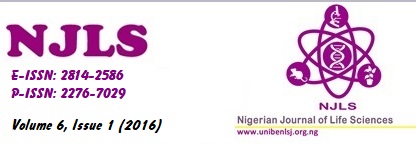HEAVY METAL ANALYSIS AND ANTIBIOTIC SENSITIVITY OF BACTERIA FROM WASTE DUMPSITES IN BENIN CITY
DOI:
https://doi.org/10.52417/njls.v6i1.295Keywords:
Municipal dumpsites, Heavy metals, Bacteria, Antibiotic resistance.Abstract
In this research work, there was analysis of the levels of heavy metals and antibiotic
sensitivity of bacteria present from waste dumpsites in Benin City, Edo state. The
methodology of this research involved the collection of samples in triplicates from random
dumpsites. The sites were Ekosodin, Oluku and Uselu all within Benin City metropolis. Also,
standard pour plating method with dilution to 10-3 was done to isolate organisms present in the soil samples. Analysis of heavy metals level was done using flame Atomic Absorption
Spectrophotometer. The results showed the concentration of heavy metal in all the samples
between 0.463 - 1.392, 0.030 – 0.070, 1.681 - 2.851, 0.685 – 1.386 and 0.342 – 0.422 all
in ppm for Lead, Cadmium, Iron, Zinc and Copper respectively. The total heterotrophic
bacterial count of all the samples ranged from 1.1×104 cfu/g to 3.4×104cfu/g. The bacterial
isolated include Bacillussubtilis, Arthrobacter sp., Pseudomona saeruginosa, Escherichia
coli, and Proteus sp. The isolates exhibited resistance to a wide range of antibiotics namely
Tarivid, Gentamycin and Ciprofloxacin, and sensitivity to Amoxicillin, Rocephin, Augmentin
and Ampiclox. The organisms with antibiotic and heavy metal resistance isolated and
identified in this study have potential application in bioremediation of environments polluted with metals and may also help to overcome the inhibition that heavy metals exert on the biodegradation of organic pollutants.

Published
Issue
Section
License
Copyright (c) 2016 https://www.unibenlsj.org.ng/index.php/njls

This work is licensed under a Creative Commons Attribution 4.0 International License.





